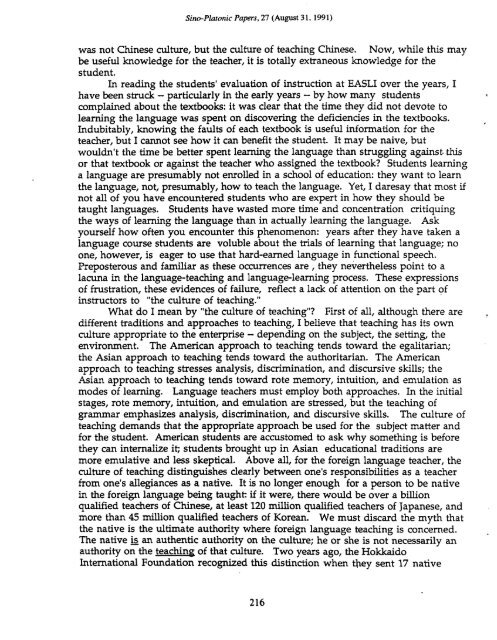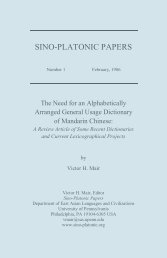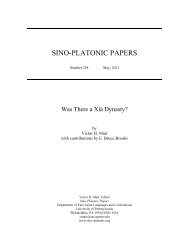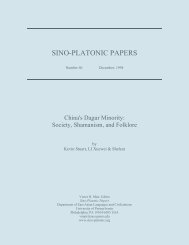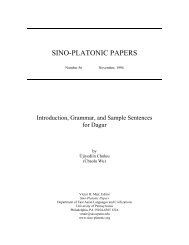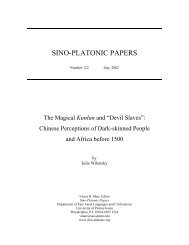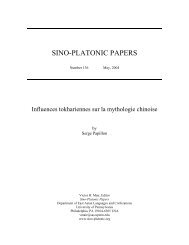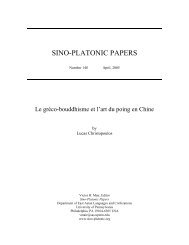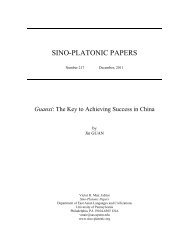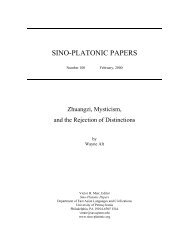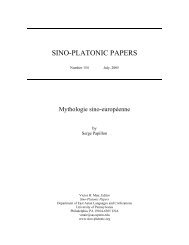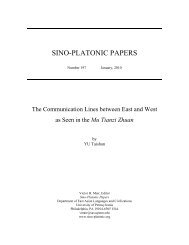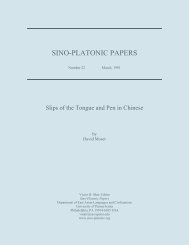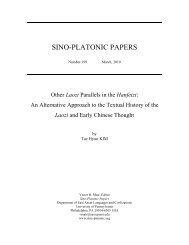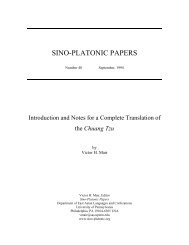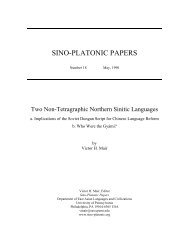Essays on Writing and Language in Honor - Sino-Platonic Papers
Essays on Writing and Language in Honor - Sino-Platonic Papers
Essays on Writing and Language in Honor - Sino-Platonic Papers
Create successful ePaper yourself
Turn your PDF publications into a flip-book with our unique Google optimized e-Paper software.
S<strong>in</strong>o-Phr<strong>on</strong>ic <strong>Papers</strong>, 27 (August 3 1, 199 1)<br />
was not Ch<strong>in</strong>ese culture, but the culture of teach<strong>in</strong>g Ch<strong>in</strong>ese. Now, while this may<br />
be useful knowledge for the teacher, it is totally extraneous knowledge for the<br />
student.<br />
In read<strong>in</strong>g the students' evaluati<strong>on</strong> of <strong>in</strong>structi<strong>on</strong> at EASLI over the years, I<br />
have been struck - particularly <strong>in</strong> the early years - by how many students<br />
compla<strong>in</strong>ed about the textbooks: it was dear that the time they did not devote to<br />
learn<strong>in</strong>g the language was spent <strong>on</strong> discover<strong>in</strong>g the deficiencies <strong>in</strong> the textbooks.<br />
Indubitably, know<strong>in</strong>g the faults of each textbook is useful <strong>in</strong>formati<strong>on</strong> for the<br />
teacher, but I cannot see how it can benefit the student. It may be naive, but<br />
wouldn't the time be better spent learn<strong>in</strong>g the language than struggl<strong>in</strong>g aga<strong>in</strong>st. this<br />
or that textbook or aga<strong>in</strong>st the teacher who assigned the textbook? Students learn<strong>in</strong>g<br />
a language are presumably not enrolled <strong>in</strong> a school of educati<strong>on</strong>: they want to learn<br />
the language, not, presumably, how to teach the language. Yet, I daresay that most if<br />
not all of you have encountered students who are expert <strong>in</strong> how they should be<br />
taught languages. Students have wasted more time <strong>and</strong> c<strong>on</strong>centrati<strong>on</strong> critiqu<strong>in</strong>g<br />
the ways of learn<strong>in</strong>g the language than <strong>in</strong> actually learn<strong>in</strong>g the language. Ask<br />
yourself how often you encounter this phenomen<strong>on</strong>: years after they have taken a<br />
language course students are voluble about the trials of learn<strong>in</strong>g that language; no<br />
<strong>on</strong>e, however, is eager to use that hard-earned language <strong>in</strong> functi<strong>on</strong>al speech.<br />
Preposterous <strong>and</strong> familiar as these occurrences are , they nevertheless po<strong>in</strong>t to a<br />
lacuna <strong>in</strong> the language-teach<strong>in</strong>g <strong>and</strong> language-learn<strong>in</strong>g process. These expressi<strong>on</strong>s<br />
of frustrati<strong>on</strong>, these evidences of failure, reflect a lack of attenti<strong>on</strong> <strong>on</strong> the part of<br />
<strong>in</strong>structors to "the culture of teach<strong>in</strong>g."<br />
What do I mean by "the culture of teach<strong>in</strong>g"? First of all, although there are A<br />
different traditi<strong>on</strong>s <strong>and</strong> approaches to teach<strong>in</strong>g, I believe that teach<strong>in</strong>g has its own<br />
culture appropriate to the enterprise - depend<strong>in</strong>g <strong>on</strong> the subject, the sett<strong>in</strong>g, the<br />
envir<strong>on</strong>ment. The American approach to teach<strong>in</strong>g tends toward the egalitarian;<br />
the Asian approach to teach<strong>in</strong>g tends toward the authoritarian. The American<br />
approach to teach<strong>in</strong>g stresses analysis, discrim<strong>in</strong>ati<strong>on</strong>, <strong>and</strong> discursive skills; the<br />
Asian approach to teach<strong>in</strong>g tends toward rote memory, <strong>in</strong>tuiti<strong>on</strong>, <strong>and</strong> emulati<strong>on</strong> as<br />
modes of learn<strong>in</strong>g. <strong>Language</strong> teachers must employ both approaches. In the <strong>in</strong>itial<br />
stages, rote memory, <strong>in</strong>tuiti<strong>on</strong>, <strong>and</strong> emulati<strong>on</strong> are stressed, but the teach<strong>in</strong>g of<br />
grammar emphasizes analysis, discrim<strong>in</strong>ati<strong>on</strong>, <strong>and</strong> discursive skills. The culture of<br />
teach<strong>in</strong>g dem<strong>and</strong>s that the appropriate approach be used for the subject matter <strong>and</strong><br />
for the student. American students are accustomed to ask why someth<strong>in</strong>g is before<br />
they can <strong>in</strong>ternalize it; students brought up <strong>in</strong> Asian educati<strong>on</strong>al traditi<strong>on</strong>s are<br />
more emulative <strong>and</strong> less skeptical. Above all, for the foreign language teacher, the<br />
culture of teach<strong>in</strong>g dist<strong>in</strong>guishes dearly between <strong>on</strong>e's resp<strong>on</strong>sibilities as a teacher<br />
from <strong>on</strong>e's allegiances as a native. It is no l<strong>on</strong>ger enough for a pers<strong>on</strong> to be native<br />
<strong>in</strong> the foreign language be<strong>in</strong>g taught: if it were, there would be over a billi<strong>on</strong><br />
quwied teachers of Ch<strong>in</strong>ese, at least 120 milli<strong>on</strong> qualified teachers of Japanese, <strong>and</strong><br />
more than 45 milli<strong>on</strong> qualified teachers of Korean. We must discard the myth that<br />
the native is the ultimate authority where foreign language teach<strong>in</strong>g is c<strong>on</strong>cerned.<br />
The native & an authentic authority <strong>on</strong> the culture; he or she is not necessarily an<br />
authority <strong>on</strong> the teach<strong>in</strong>g of that culture. Two years ago, the Hokkaido<br />
Internati<strong>on</strong>al Foundati<strong>on</strong> recognized this dist<strong>in</strong>cti<strong>on</strong> when aey sent 17 native<br />
r


